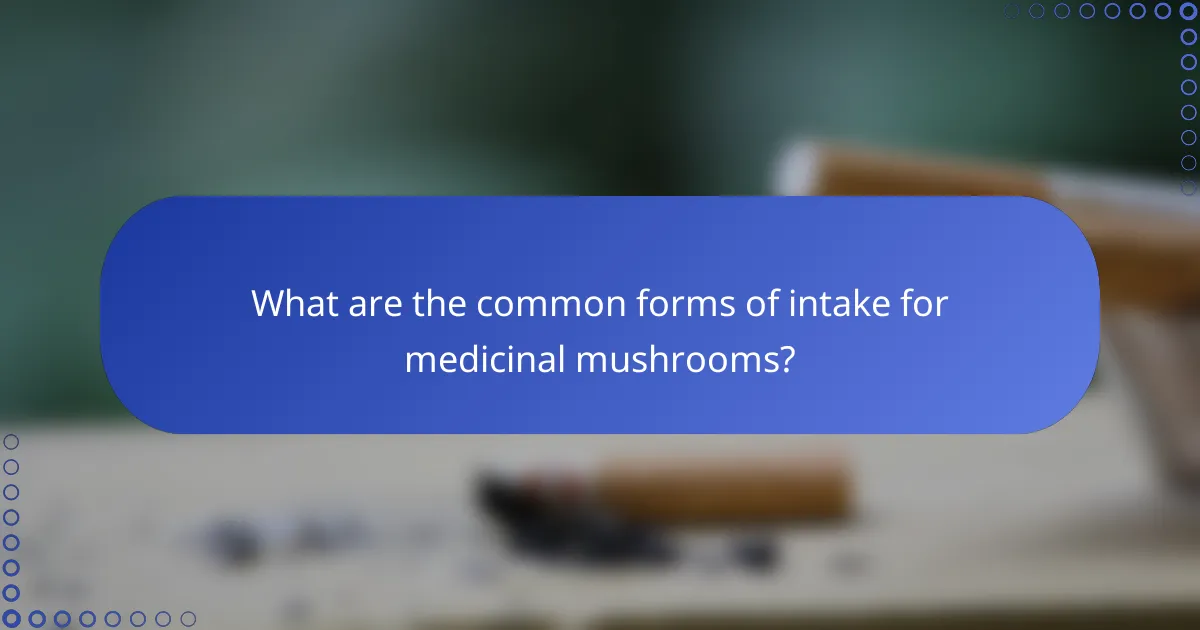Medicinal mushrooms provide significant health benefits, including immune support and anti-inflammatory effects. This article explores their various forms of intake, such as capsules and teas. Additionally, it examines ongoing research into their efficacy for treating rare health conditions. Understanding these aspects can enhance your approach to integrative health.

What are the most significant health benefits of medicinal mushrooms?
Medicinal mushrooms offer significant health benefits, including immune support, anti-inflammatory properties, and potential cancer-fighting effects. These fungi contain bioactive compounds like beta-glucans, which enhance immune response. Research indicates that varieties such as reishi, lion’s mane, and chaga can improve cognitive function, reduce stress, and promote overall well-being. Forms of intake include capsules, powders, and teas, making them accessible for various preferences. Ongoing studies explore their efficacy in treating rare conditions, highlighting their potential in integrative health approaches.
How do medicinal mushrooms support immune function?
Medicinal mushrooms enhance immune function through various bioactive compounds. These compounds, such as beta-glucans, stimulate immune cells, improving the body’s response to pathogens. Research indicates that mushrooms like reishi and shiitake exhibit unique properties that promote immune health. For example, reishi contains triterpenes that modulate immune activity, while shiitake provides polysaccharides that support immune responses.
Which medicinal mushrooms are known for their anti-inflammatory properties?
Medicinal mushrooms known for their anti-inflammatory properties include reishi, chaga, lion’s mane, and turkey tail. These fungi contain bioactive compounds that modulate inflammation and support immune function.
Reishi (Ganoderma lucidum) is renowned for its triterpenes, which exhibit potent anti-inflammatory effects. Chaga (Inonotus obliquus) contains betulinic acid, known for reducing inflammation. Lion’s mane (Hericium erinaceus) promotes nerve health and has anti-inflammatory properties linked to its polysaccharides. Turkey tail (Trametes versicolor) supports gut health and immune response, contributing to its anti-inflammatory benefits.
Research continues to explore these mushrooms’ unique attributes and their potential in managing rare inflammatory conditions.
What role do medicinal mushrooms play in mental health?
Medicinal mushrooms can significantly enhance mental health by reducing anxiety and depression symptoms. These fungi contain compounds like beta-glucans and triterpenes that support brain function and mood regulation. Research indicates that specific species, such as Lion’s Mane and Reishi, may promote neurogenesis and improve cognitive function. Additionally, they offer unique benefits, such as stress reduction and enhanced emotional well-being.
How do different medicinal mushrooms affect energy levels?
Different medicinal mushrooms can enhance energy levels through various mechanisms. For instance, reishi mushrooms are known to reduce fatigue, while cordyceps can improve stamina and athletic performance. Lion’s mane may support cognitive function, indirectly boosting energy through mental clarity. Research indicates that these mushrooms contain bioactive compounds that influence energy metabolism and overall vitality.
Which medicinal mushrooms are linked to longevity?
Reishi, cordyceps, and lion’s mane mushrooms are linked to longevity. Research indicates these medicinal mushrooms may enhance immune function, reduce inflammation, and support brain health, contributing to a longer life. For instance, reishi contains triterpenes that may lower blood pressure, while lion’s mane promotes nerve growth factor production. Studies suggest that regular consumption can lead to improved health outcomes in aging populations.

What are the common forms of intake for medicinal mushrooms?
Common forms of intake for medicinal mushrooms include capsules, powders, teas, tinctures, and extracts. Each method offers unique benefits and convenience for users. Capsules provide easy dosing, while powders can be added to foods or beverages. Teas allow for a soothing experience, and tinctures offer concentrated benefits. Extracts are potent forms that maximize the active compounds.
How do powdered forms of medicinal mushrooms compare to capsules?
Powdered forms of medicinal mushrooms generally offer higher bioavailability compared to capsules. Powdered mushrooms provide a concentrated source of active compounds, enhancing absorption. Capsules may have fillers and slower digestion rates, limiting efficacy. Both forms support health benefits, but powdered options often deliver quicker results in addressing conditions.
What are the benefits of using medicinal mushrooms in teas?
Medicinal mushrooms in teas offer numerous health benefits, including immune support, stress reduction, and enhanced mental clarity. These fungi contain bioactive compounds like polysaccharides and triterpenes, which contribute to their medicinal properties. Research indicates that specific mushrooms, such as reishi and lion’s mane, can improve cognitive function and promote overall wellness. Incorporating these mushrooms into tea provides a convenient and enjoyable way to access their health benefits.
Which culinary uses are popular for medicinal mushrooms?
Medicinal mushrooms are popular in culinary uses for enhancing flavor and providing health benefits. Common applications include soups, stir-fries, teas, and supplements. For example, reishi mushrooms are often brewed into teas for their immune-boosting properties, while shiitake mushrooms are widely used in savory dishes for their umami flavor. Additionally, lion’s mane can be incorporated into recipes for cognitive support, making it a versatile ingredient in both traditional and modern cooking.
How do tinctures and extracts of medicinal mushrooms work?
Tinctures and extracts of medicinal mushrooms work by concentrating the bioactive compounds, enhancing their therapeutic effects. These compounds, such as polysaccharides and triterpenes, interact with the immune system, exhibit antioxidant properties, and may support overall health. Research indicates their potential in addressing rare conditions, showcasing unique attributes like the high beta-glucan content found in certain mushrooms. Forms of intake, such as liquid tinctures or powdered extracts, facilitate easy consumption and absorption, maximizing health benefits.

What recent research highlights the potential of medicinal mushrooms for rare conditions?
Recent research indicates that medicinal mushrooms show promise for treating rare conditions. Studies highlight the efficacy of species like Reishi and Lion’s Mane in addressing specific health issues. For instance, research on Lion’s Mane suggests it may support nerve regeneration, beneficial for conditions like peripheral neuropathy. Additionally, Reishi has been linked to immune modulation, potentially aiding in rare autoimmune disorders. These findings underscore the unique attributes of medicinal mushrooms in therapeutic applications.
Which studies focus on the efficacy of medicinal mushrooms for cancer treatment?
Research studies indicate that certain medicinal mushrooms, such as turkey tail and reishi, show promise in cancer treatment. Clinical trials have explored their potential to enhance immune response and reduce tumor growth. For example, a study published in “Cancer Science” found that polysaccharides from turkey tail mushrooms improved survival rates in patients undergoing chemotherapy. Another research highlighted reishi’s compounds that may inhibit cancer cell proliferation. These findings support the growing interest in integrating medicinal mushrooms into cancer therapies.
What findings exist regarding medicinal mushrooms and autoimmune diseases?
Research indicates that certain medicinal mushrooms may have beneficial effects on autoimmune diseases. For instance, reishi and cordyceps mushrooms exhibit immunomodulatory properties, potentially helping to regulate immune responses. Studies suggest that these mushrooms can reduce inflammation and support overall immune health. However, more clinical research is necessary to confirm these findings and establish specific treatment protocols.
How are medicinal mushrooms being researched for neurological disorders?
Medicinal mushrooms are being researched for neurological disorders due to their neuroprotective properties. Studies indicate that compounds like beta-glucans and triterpenoids in mushrooms may enhance cognitive function and reduce inflammation. Research on varieties such as lion’s mane and reishi shows potential in alleviating symptoms of conditions like Alzheimer’s and Parkinson’s. Ongoing clinical trials aim to establish dosage, efficacy, and safety for these applications.
What rare conditions have shown promising results with medicinal mushroom therapy?
Medicinal mushrooms have shown promising results in treating rare conditions such as multiple sclerosis, certain cancers, and rare autoimmune diseases. Research indicates that compounds like beta-glucans and triterpenoids in mushrooms enhance immune response and reduce inflammation. For example, reishi mushrooms have demonstrated potential in alleviating symptoms of multiple sclerosis through immune modulation. Additionally, studies on lion’s mane mushrooms suggest neuroprotective effects that may benefit conditions like Alzheimer’s disease. These findings highlight the unique therapeutic attributes of medicinal mushrooms in addressing rare health challenges.

What considerations should be made when using medicinal mushrooms?
When using medicinal mushrooms, consider dosage, potential interactions, and individual health conditions. Proper dosage ensures safety and efficacy. Some mushrooms may interact with medications, affecting their effectiveness. Individuals with allergies or specific health issues should consult healthcare professionals before use.
How can one ensure the quality and safety of medicinal mushrooms?
To ensure the quality and safety of medicinal mushrooms, source them from reputable suppliers. Verify that they undergo rigorous testing for contaminants like heavy metals and pathogens. Look for certifications that demonstrate adherence to quality standards. Research the specific mushroom species for known benefits and potential side effects. Proper preparation methods, such as cooking or extracting, can enhance safety and efficacy.
What are the potential side effects of medicinal mushrooms?
Medicinal mushrooms can cause side effects, including digestive upset, allergic reactions, and interactions with medications. Some individuals may experience headaches or dizziness. Rarely, certain species can lead to more severe reactions like liver toxicity. Always consult a healthcare professional before use.
How do dosage and timing affect the benefits of medicinal mushrooms?
Dosage and timing significantly influence the health benefits of medicinal mushrooms. Optimal dosages enhance their therapeutic effects, while timing can affect absorption and efficacy.
For instance, taking lion’s mane mushroom in the morning may boost cognitive function throughout the day. Conversely, reishi mushroom is often recommended before bed to promote relaxation and improve sleep quality.
Research indicates that consistent intake, such as daily dosing, maximizes benefits for conditions like anxiety and inflammation. Adjusting the timing according to individual needs can further tailor the effects, ensuring users receive the most from these natural remedies.
In summary, understanding the right dosage and timing is crucial for harnessing the full potential of medicinal mushrooms.
What best practices should be followed when integrating medicinal mushrooms into a health regimen?
Integrating medicinal mushrooms into a health regimen requires careful consideration of dosage, quality, and individual health needs. Start with low doses to assess tolerance, gradually increasing as needed. Choose high-quality, organic sources to ensure potency and avoid contaminants. Consulting with a healthcare professional is essential, especially for those with underlying health conditions or those taking medications. Research shows that specific varieties, like reishi and lion’s mane, may offer unique benefits for stress reduction and cognitive function.